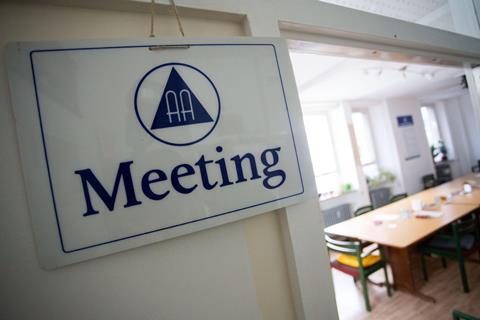Recovering alcoholic and writer Lauren Windle illustrates the many elements of an alcoholics anonymous meeting that she believes the church could learn from.

Imagine walking into church, there’s no set seat for anyone, no clusters of couples or family units, everyone is dispersed. You’re greeted by someone who asks how you are, and they mean it. Instead of offering your stock response of: “Yeh great thanks, you?” You say: “I’ve been struggling a bit with fear of man today, but I think it’s off the back of some criticism I got at work.” The person smiles kindly, it’s not a surprising response, it’s not an overshare, it’s just honest. They nod, a knowing and friendly gesture of recognition but offer no advice or solution.
You make your way to your seat, you recognise some people, but not everyone. You sit next to a woman with a small dog, she introduces herself and you do too. You tell her you love dogs so she releases it to your custody for the rest of the service, it sits on your lap while you stroke its soft fur. It’s calming.
In front of you is a celebrity you recognise from the pages of one of your magazines, she’s shorter in real life. She’s sitting next to a man you recognise as the rough sleeper who sits by the cash point outside Co-op asking if you have any spare change. You think how hard it must be for him in our new cashless society. They’re having a polite conversation.
No story is too far or too shocking, and every single one ends in redemption but not perfection.
The service is started by the man at the front. He kicks off with a moment of quiet reflection of those who are suffering. You close your eyes and say a silent prayer. Next there’s a talk, a powerful testimony of transformation from the very darkest echelons of society to spectacular freedom. As the speaker shares you close your eyes, and allow the full magnitude of the words to wash over you. Every now and again you deeply relate to an element of their story, so you laugh as a gesture of solidarity and thanks for the vulnerable honesty they are offering. No story is too far or too shocking, and every single one ends in redemption but not perfection.
The congregation are invited to share too, some people’s responses are triggered by a comment or element of the main testimony. These people thank the speaker and explain their experience. Others are in too fraught a place to have even heard the story, they share from the heart about their day, their struggles and their pain. No one tries to fix, no one jumps in, no one interrupts, everyone just listens.
The collection covers the costs of the room hire and the teas and coffees, they don’t want or need extra money.
The session draws to an end and a tin is handed around for collection, congregation members are encouraged to contribute £2 each, but only if they can afford it. It is calculated to cover the costs of the room hire and the teas and coffees, they don’t want or need extra money. Anyone who is new to the group is told not to contribute as the gathering is a gift to them.
Next people are asked to leave their chairs in order to line the outside of the room in one big circle. The group hold hands, each person connected to the others. The dog, excited by the disturbance, plods about the middle of the circle before heading back to its owner for reassurance. The session ends with a simple prayer to God that he would provide his peace, wisdom and courage.
This isn’t church though, it’s an alcoholics anonymous meeting.




































No comments yet